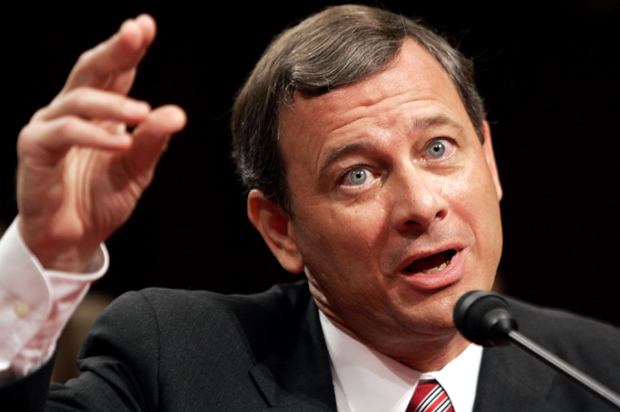Cue up the sad David Brooks violin playing softly in the corner of a dark alley at 3 a.m., because Americans have no faith in powerful institutions anymore. One of those institutions would be the marbled shrine atop our third branch of American government, the Supreme Court. A new Associated Press poll shows that “only 1 person in 10 is highly confident that the justices will rely on objective interpretations of the [Affordable Care Act] rather than their personal opinions” in the Court’s impending King v. Burwell decision.
To us, that 10 percent figure seems way too high. As far as we can tell, it’s not 1 in 10 Americans who view our Supreme Court as a neutral collection of jurists who just want to call “balls and strikes,” but 1 American total: Chief Justice John Roberts. And maybe even not him?
The American people, the always trusty American people, have the Supreme Court’s number here. As with so many cases about why the American people have lost trust in a powerful institution, we can look to some of the powerful institution’s recent actions, going back at least to Bush v. Gore through Citizens United and Hobby Lobby and whatever primetime hit job comes next.
That next hit job may come soon in King v. Burwell, which, if ruled for the plaintiffs, would invalidate premium subsidies for those who’ve purchased individual health insurance plans on federally facilitated exchanges. The expected decision based on tea-leaf readings coming out of oral arguments was 5-4 or 6-3 in favor of upholding the subsidies, which tells you a lot about how weak the case is. But there is another possible outcome: 5-4 to strike down the subsidies, because the Supreme Court is ruled by a five-member majority of conservative justices who think that the Affordable Care Act is dumb.
The last time a legal challenge to Obamacare of this breadth made it to the Supreme Court, four justices voted not just to strike down the individual mandate but the entire law as well, because they believed that the law was dumb. They didn’t like it! Get rid of it! John Roberts originally sided with them but then, to the consternation of his conservative colleagues, switched his vote because such a hackish decision would have made the Supreme Court look too hackish. Roberts contented himself merely to gut the hell out of the Medicaid expansion and force the Obama administration to acknowledge that the individual mandate is a tax.
Very few Court watchers are basing their predictions of the King decision on the merits of the case, and rightly so. If it was being decided on the merits of the case, everyone would be betting that it would be upheld 9-0. Does anyone think that’s going to happen? No. It will all come down to how John Roberts, and perhaps Anthony Kennedy, feel about managing the politics. They want to screw over Obamacare but yeeeesh, would that backfire on the Court and conservatives? Would that make life more difficult for the Republican party heading into 2016? On the other hand: Would John Roberts ever eat lunch in Conservative This Town again if he sided with The Libruls to uphold a core component of Obamacare? It’s all about finding the right balance of these competing political considerations. The Democratic and Republican parties rightly recognize the nature of the situation here and have spent months trying to get inside John Roberts’ head. It is what it is.
Let’s consider a more generous version of what’s happened to the Supreme Court of late: that it’s merely followed the broader trend in American politics towards polarization. Antonin Scalia and Ruth Bader Ginsburg might be looking at the same piece of legislation before them but seeing something completely different, so divergent have the liberal and conservative worldviews become. And these are justices who were appointed a generation ago. The next round of justices will have made their careers during this time of high-stakes judicial polarization.
That next round of justices may come very soon, since several Supreme Court justices are approximately one million years old. As Ian Millhiser writes at Think Progress, Rick Perry correctly emphasized the importance of the next presidential election in a speech this weekend:
“Something I want you all to think about is that the next president of the United States, whoever that individual may be, could choose up to three, maybe even four members of the Supreme Court,” Perry told the South Carolina audience. So this election “isn’t about who’s going to be the president of the United States for just the next four years. This could be about individuals who have an impact on you, your children, and even our grandchildren. That’s the weight of what this election is really about.”
I hate the “you have to vote in the next election because of the Supreme Court!” argument. I hate it because it lets the candidates off the hook: they can offer nothing whatsoever to voters and then rely on SCOTUS fearmongering to get out the vote. I also hate it because it’s a very credible argument. There is never going to be another David Souter, or a justice who gets confirmed and then has an ideological shift on the bench. This next presidential election will also be an election for the next generation of the Supreme Court, and it’s no tragedy that most Americans understand this cynical reality.

